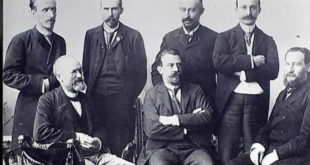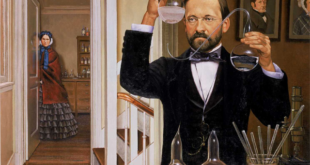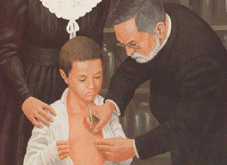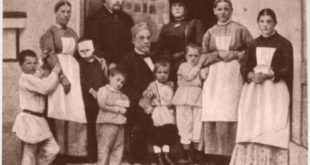Paris, Sept. 20, 1895 — The following information concerning the closing hours of Prof. Pasteur’s life has been obtained by the correspondent of The United Press, who has just returned from Villeneuve:
Prof. Pasteur’s condition became seriously worse on the evening of Friday last. Albuminuria was observed, the heart became very weak, and painful and violent spasms became frequent. About 9 o’clock yesterday morning, Prof. Pasteur’s wife asked him whether he suffered much pain. The dying man faintly whispered, “Yes.” This was the last word that he uttered. Afterward he was most of the time unconscious.
When it was seen that the end was near. Prof. Pasteur’s son, who was staying at San Sebastian, was summoned, but he did not arrive in time to see his father alive. Mme. Pasteur, a few near relatives, Dr. Roux, and others engaged in the Pasteur Institute were present at the deathbed. After his death, Mme. Pasteur closed her husband’s eyes, and placed a crucifix in his hands.
At L’Etang Park, in a room on the first floor of a ramshackle building, above stables where a hundred horses are kept for use in connection with the preparation of diphtheria serum, lie the remains of the great chemist. The chamber has a low ceiling, and the walls are covered with cheap green paper. A small carpet is spread on the deal floor. There are two wicker-seated chairs and an armchair. The body lies on a simple, curtainless wooden bedstead. On a plain table stands a branched candlestick in which are lighted candles. Close by, in a cupboard placed between two windows, are the books that M. Pasteur used to take a Villeneuve from Paris whenever he paid a visit there.
The unpretentious character of the surroundings seems to throw into relief the reposeful features and strong, benevolent face of the dead man. The hands are clasped on the crucifix which Mme. Pasteur placed in them when her husband died. On the white coverlet are arrayed many of the orders and other decorations which were conferred upon M. Pasteur during his lifetime. The members of the family watch mourning by the bedside.
The body of M. Pasteur will probably be embalmed to-night. The public will be admitted to view the remains to-morrow.
While The United Press correspondent was in the death chamber, M. Poincare, French MInister of Public Instruction, arrived. His mission was to request the family to allow the Government to give the dead scientist national obsequies, and to infer the body in the Pantheon. M. Valery, the husband of M. Pasteur’s daughter, on behalf of the family, deferred an acceptance of these offers until M. Octave Ferard, M. Pasteur’s executor and colleague in the Academy reads the will of the dead man to the assembled family to-night. Nevertheless, it is already settled that the body will be exposed in the library of the Pasteur Institute. It is understood that the family desire to have the interment in the garden of the Pasteur Institute, and will request the Government that this be done.
It is expected that the funeral will take place on Tuesday next, but as yet the day has not been fixed.
A stream of visitors to-day signed the register at Villeneuve. Among them were many eminent men of science, Academicians, and Societaires.
The little telegraph office at Garches, which is close to Villeneuve, was kept busy the whole day receiving telegrams of condolence that were sent to Mme. Pasteur. President Faure, M. Honataux, French Minister of Foreign Affairs; the King of the Belgians, who is visiting in Paris; M. Sausier, Military Governor in Paris; Dr. Lepine, and the Paris Students’ Association were among the first to send messages to the widow.
Originally published in The New York Times on September 30, 1895.
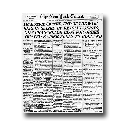
 Pasteur Brewing Louis Pasteur – Science, Health, and Brewing
Pasteur Brewing Louis Pasteur – Science, Health, and Brewing 